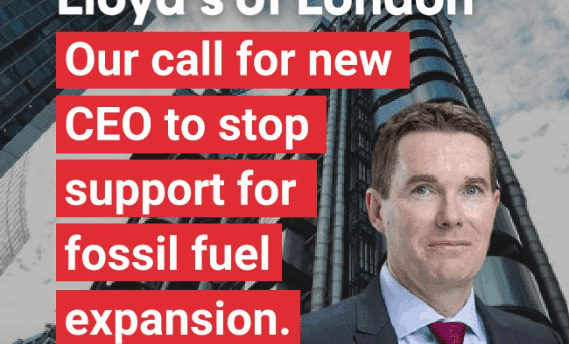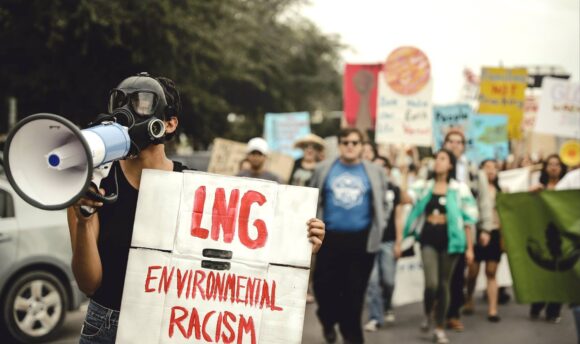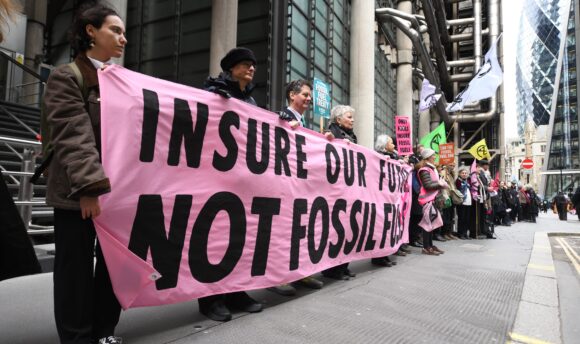Read The Guardian article, “UK students pledge ‘career boycott’ of insurers over fossil fuels,” published on May 24, 2023 covering the students who refuse to work for climate-wrecking insurance companies.
The text of the letter to Lloyd’s of London, Beazley, Brit, Hiscox, Liberty Managing Agents, Chaucer and Tokio Marine Kiln management is as follows:
“We, students and young graduates, will not work for Lloyd’s of London and the insurance companies that insure EACOP, Rosebank, and fossil fuel expansion”
To the management of Lloyd’s of London, Beazley, Brit, Hiscox, Liberty Managing Agents, Chaucer and Tokio Marine Kiln.
We, students and recent graduates from UK universities (University of Oxford, University of Cambridge, London School of Economics and political sciences, Imperial College London, University College London, King’s College London, University of Warwick, University of Edinburgh, University of Leeds, University of Manchester, University of Sheffield), are writing to inform you that we will not work for your companies if you insure new fossil fuel expansion and projects such as the East African Crude Oil Pipeline (EACOP) and the Rosebank oil field.
Insurance companies have a huge amount of power to help steer us towards a greener and sustainable future. But instead of protecting us from catastrophic damages caused by the climate crisis, it turns out that insurance companies in the Lloyd’s of London market are actually massively continuing to back dirty, destructive fossil fuel projects for profits. Since June 2022, many students have spent hours protesting in front of Lloyd’s of London and the offices of many managing agents, as well as emailing and calling their employees, to discuss the outstanding risks of the East African Crude Oil Pipeline and the Rosebank oil field and the necessity to stop insuring climate wrecking projects.
The scientific consensus leaves no room for debate: fossil fuel projects belong in the past. The latest IPCC report states that existing fossil fuel infrastructure already exceeds the emission thresholds that would allow us to limit warming to 1.5°C by 2050. Creating new fossil fuel infrastructure will only take us further beyond these thresholds into runaway climate chaos. The International Energy Agency itself affirmed in 2021 that there should be no more exploitation and development of new oil and gas fields.
If coal, oil, and gas companies can’t find insurance or afford insurance, they won’t be able to build new projects or continue operating dirty infrastructure that drives the climate crisis, harms local communities, and violates Indigenous rights.
Yet insuring climate chaos continues.
Despite the overwhelming weight of scientific warnings against new oil & gas, attempts are still being made to force through fossil fuel projects such as the East African Crude Oil Pipeline. Not only would this mega-oil project, led by the French energy giant TotalEnergies and the China National offshore oil corporation, require the construction of the world’s largest heated pipeline. It would also affect 2,000 kilometres squares of protected areas in Uganda and Tanzania, risks polluting Africa’s two largest water reserves on which 40 million people depend on, would force the displacement of more than a 100,000 people, and would emit an additional 34 million tCO2 per year.
Similarly, Norwegian oil giant Equinor is pushing to develop the biggest undeveloped oil field in the UK, Rosebank. Rosebank stands to produce more than 200 million tonnes of CO2, which would be more than the combined annual CO2 emissions of all 28 low-income countries in the world, including Uganda, Ethiopia and Mozambique. In other words, emissions from this one UK field would be more than those created by the 700 million people in the world’s poorest countries in a year. These are among the same countries that have contributed the least to the climate crisis but are already experiencing the worst impacts of a warming planet.
As TotalEnergies and Equinor are currently seeking insurance for the EACOP and Rosebank respectively, we wish to remind the insurance industry of the key role that they must play in the energy transition and what the future of their industry expects of them.
We know positive change and leadership is possible. 23 insurers have already committed not to insure EACOP, including several of Lloyds of London’s managing agents. In recent years, the insurance industry has taken a series of steps to accelerate the transition from fossil fuels to renewable energy sources. Since 2017, at least 41 insurers have adopted restrictions on underwriting coal, 22 on tar sands and 13 on conventional oil and gas. But Lloyd’s of London and many Lloyd’s managing agents are lagging behind and putting our lives at risk by continuing to insure oil and gas.
Following Antonio Guterres’ declaration telling students “You hold the cards. Your talent is in demand from multinational companies and big financial institutions. […] Don’t work for climate wreckers.”, we will not stand for this and we refuse to put our professional careers at the service of climate wreckers that insure those responsible for the climate crisis. Insurers’ lack of action on climate change will cost them talented workers.
True climate leadership from Lloyd’s and its managing agents would be refusing to insure these projects and adopting comprehensive fossil fuel exclusion policies in line with the best practices of their peers, including a commitment not to support any new oil and gas projects. Instead, they should be supporting provision of insurance coverage for renewable energy projects.
We know change is not only possible but inevitable. This is why we pledge to only work for insurance companies with coherent, costed climate strategies that are equal to the urgency of the situation. We hope to be able to work with you as soon as possible, to face the complexity of an urgent, effective and sustainable transition which can not be done without the insurance sector.



